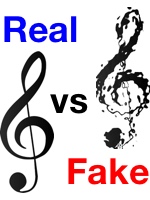Real Vs Fake Music Theory: How To Tell If You Are Actually Learning Music Theory


Are you one of these people who think that music theory is useless or restricts your creativity? If so, here's my question for you: are you absolutely SURE that you are actually learning music theory and not something else entirely? If you are struggling in making music theory work for you, maybe it's because you are studying the wrong things! Let me explain.
There seems to be a widespread misconception of what music theory is and what music theory isn't (or is just accessory to it). A lot of people confuse music theory with music notation, or with learning by heart the spelling of all scales. While these things may help in some specific contexts, they are not part of what music theory really is - and if you focus on these, then it's easy to get sidetracked.
Music theory is the study of how you can control the emotional impact of your music. I know this definition may sound strange, but if you think about it, every concept in music theory is there because it has an emotional impact on the listener. We study consonance and dissonance because they have a psychological effect on the listener. We study keys and chords because they help us composing pieces that have a sense of unity (rather than sounding like random disconnected notes). We study scales because every scale has a specific feeling to it.
Let's see a few of the most common misconceptions about what music theory is and is not, and how they can distract you from the important issues:
1. Music theory is NOT music notation
This is one of the most widespread and damaging beliefs I have seen. While music notation may be useful or even necessary to study some areas of music theory (counterpoint comes to mind), it's not music theory per se.
In fact, I know a lot of musicians who do not know standard notation, but know music theory well. There is no need to understand standard notation in order to understand how chord progressions work, how to work with rhythm, how to use musical form in your songs, and many other things.
If you keep thinking that music notation is music theory, then take a page from the movie composer Hans Zimmer (Gladiator, the Dark Knight) who writes and arranges all his works on the computer using a piano roll rather than a score. He IS using music theory as an aid for composing but he is NOT using music notation.
2. Music theory is NOT learning a lot of jargon
Sure, knowing a bit of music theory jargon is very useful: after all it's just faster to say "E Phrygian dominant scale" than "E F G# A B C D... here put this finger here and there...". The problem arise when people misunderstanding knowing the names of thing for real understanding.
Names are just shortcuts we use when we communicate with each other. It does not really matter to the listener if you know that what you are playing is called a "Phrygian Dominant" scale or not... and in fact it does not even matter to you, if you know how to use it.
Many songwriters who say "I don't know any theory", have in fact an intuitive understanding of basic theory, they just don't know the names! Just the other day I was talking with a singer-songwriter and she was trying to tell me that she always finishes her songs with some 'stock' chord progressions. After a short conversation, it became apparent that she was talking about standard 4-1 and 5-1 cadences (respectively plagal and authentic cadences), and she knew exactly how to use them. Would knowing these names give her superior understanding?
3. Music theory is NOT being able to name chords
Ever seen those "name that chord" threads that happen in any guitar online forum? "Hey my notes are F B D# G#, what chord is this?". The thing that puzzles me is that once somebody writes the name of the chord, then the thread ends... as if knowing the symbol we use to indicate it was granting us actual knowledge.
In music theory we are more interested in how the chord sounds, in what chord progressions you can use it, what other chords will work with it, how its notes tend to move, what alterations are possible. Naming the chord is the least of our concerns because it adds nothing to your ability to actually make music. Think about it: if you could magically know the names of all chords, would you really be a better composer?
4. Music theory is NOT a set of scale patterns
Another damaging misconception is that if you learn just a few scale patterns then you are doing music theory. I already expressed my negative opinion on 'scale systems" like the CAGED system in other articles, so I will not spend a lot of time on it. I just want to remark that all this focus on playing "the A shape" or "the G shape" is just adding another layer of jargon on top of an already unclear situation (for the student).
It is not a chance that a lot of players brought up in these "scale systems" have issues with music theory or focus on things that are not musical useful. A simple rule of thumb here would be: "if you can also do it on another instrument, then you are on the right road". You can't play a "A shape" scale on a piano, but you CAN play a D major scale, for instance. Focus on music theory, not fretboard theory.
So how do I know if it's real theory?
By the way it is taught. Learning music theory can only be done in an experiential way: that is you must HEAR the musical effect of EVERY concept you study. If you learn a scale, you need to also hear it. The same applies if you learn a new chord, a new chord progression, or any new 'trick'. This is what ear training should be, incidentally.
The litmus test is this: every time you learn something, ask yourself if you can compose a very short piece of music using what you learned. If the answer is 'no' then you are not really learning anything.
Every time you study theory, you would be well-served in changing the questions "how is it called" and "how is it notated" into the more useful questions: "how it works", and "how can I use it".
Do you want to know what real music theory looks like when applied to chords and harmony on guitar? You can find it by clicking on the button below:
